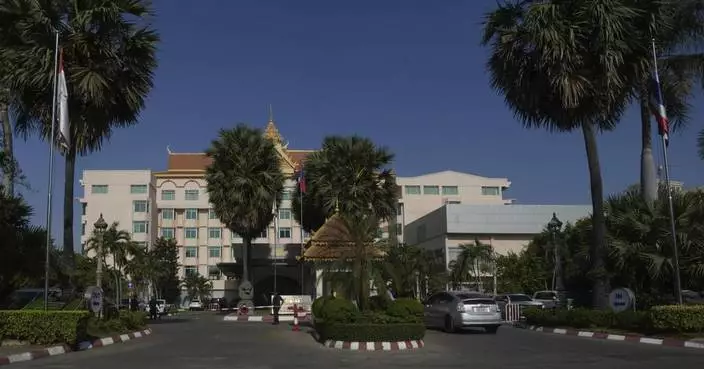German authorities on Tuesday handed over to Israel some 5,000 documents kept by a confidant of Franz Kafka, a trove whose plight could have been plucked from one of the author's surreal stories.
The papers returned include a postcard from Kafka from 1910 and personal documents kept by Max Brod, which experts say provide a window into Europe's literary and cultural scene in the early 20th century.
They are among some 40,000 documents, including manuscripts, correspondence, notebooks and other writings that once belonged to Brod, which are being brought together again in Israel's National Library. They had ended up in bank vaults in Switzerland and Tel Aviv, a Tel Aviv apartment and in a storage facility in Wiesbaden, Germany, where police found them tucked among forged Russian avant-garde artworks.
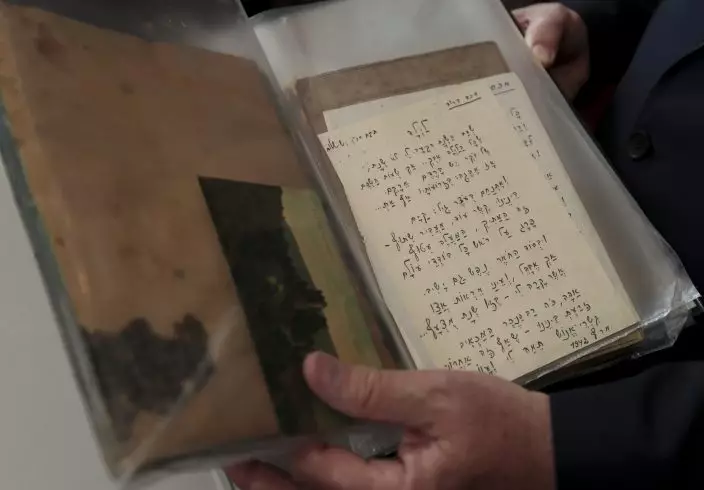
Israel's ambassador in Germany, Jeremy Issacharoff, holds documents prior to a handing over ceremony at the embassy of Israel in Berlin, Germany, Tuesday, May 21, 2019. German authorities are handing over to Israel some 5,000 documents kept by a confidant of Franz Kafka, a trove whose plight could have been plucked from one of the author's surreal stories. (AP PhotoMichael Sohn)
"I think he (Kafka) would really be amused," said National Library archivist and humanities collection curator Stefan Litt, who helped identify the papers recovered in Germany. "He couldn't invent by himself a better plot."
The documents recovered in Wiesbaden have little to do with Kafka himself, but make the Brod collection complete and shine a light on Brod and his circle, which included Kafka and other writers, Litt said.
"This is an important chapter in Max Brod's estate," Litt said. "And it's always good for researchers to have as complete a picture as possible."
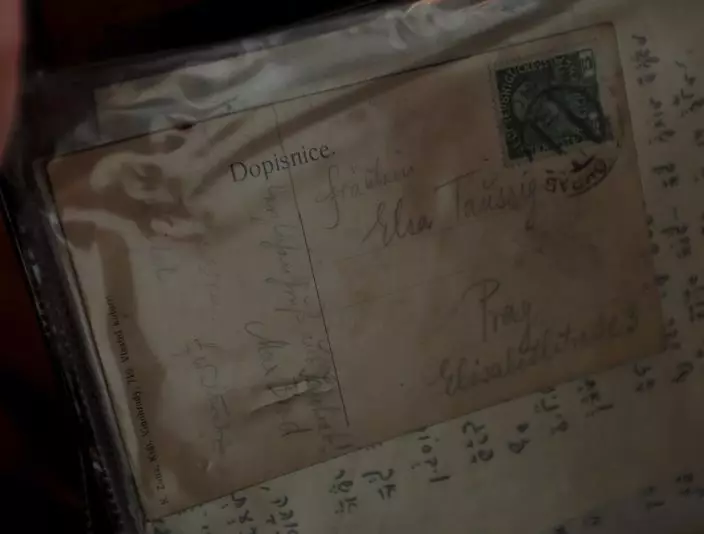
Israel's ambassador in Germany, Jeremy Issacharoff, holds documents prior to a handing over ceremony at the embassy of Israel in Berlin, Germany, Tuesday, May 21, 2019. German authorities are handing over to Israel some 5,000 documents kept by a confidant of Franz Kafka, a trove whose plight could have been plucked from one of the author's surreal stories. (AP PhotoMichael Sohn)
Kafka, a Bohemian Jew from Prague who lived for a while in Berlin, was close friends with Brod, himself an accomplished writer. Shortly before his untimely death at 40 of tuberculosis in 1924, Kafka bequeathed his writings to Brod, reportedly telling him to burn them all unread.
Instead, Brod published much of the collection, including the novels "The Trial," The Castle," and "Amerika," helping to posthumously establish Kafka as one of the great authors of the 20th century. He also brought "Kafkaesque" into the English language to describe a situation evoking a bizarre, illogical or nightmarish situation like the ones Kafka wrote about.
After the Nazis occupied the Sudetenland region of Czechoslovakia in 1938, Brod fled to escape persecution with the entire collection to what was then British-ruled Palestine. When Brod died, he left his personal secretary Esther Hoffe in charge of his literary estate and instructed her to transfer the Kafka papers to an academic institution.
Instead, she kept the documents for the next four decades and sold some, like the original manuscript of Kafka's "The Trial," which fetched $1.8 million at auction in 1988. She kept some of the items in a bank vault in Tel Aviv, some in Switzerland, and others at her apartment in Tel Aviv.
When she died in 2008, the collection went to her two daughters, who fought to keep it but eventually lost a battle in Israel's Supreme Court in 2016. The court sided with the country's National Library, whose lawyers had argued the Kafka papers were "cultural assets" that belonged to the Jewish people.
Both daughters have now died, and the documents stored in Israel have already been transferred to the National Library's care. The documents held in Switzerland should be on their way soon after the National Library won a court case in Zurich last month, which upheld the Israeli verdict and ordered that several safe deposit boxes be opened and their contents shipped to the institution in Jerusalem.
But that left the documents in Germany, which had been stolen from Hoffe's apartment about a decade ago.
They ended up with an Israeli dealer, who tried in 2013 to sell them to the German Literature Archive in Marbach — the same institution that bought "The Trial" manuscript at auction in 1988. The German archive instead reported the offer to Israel's National Library, which then got authorities involved, Litt said.
The documents resurfaced at the Wiesbaden storage facility of an international forgery ring that produced and sold millions of euros (dollars) worth of forged paintings, which was taken down by German authorities that same year, Litt said. Since then, they have been stored by German authorities as Litt and others sought to confirm their provenance.
Those being returned include correspondence between Brod and his wife, and even some of his notebooks from high school, Litt said.
"There's no doubt these materials were part of his papers," he said.
The manuscript of "The Trial," however, was properly purchased by the German Literature Archive in the 1988 Sotheby's auction, and the National Library has no claim on it, he said.
"We're happy it's in safe hands," Litt said.
BEIRUT (AP) — The European Union announced Thursday an aid package for Lebanon of 1 billion euros — about $1.06 billion — that will mostly go to boost border control to halt the flow of asylum seekers and migrants from the small, crisis-wracked country across the Mediterranean Sea to Cyprus and Italy.
The deal follows other EU aid packages for countries such as Egypt, Tunisia and Mauritania to fortify their borders. It comes against a backdrop of increasing hostility toward Syrian refugees in Lebanon and a major surge in irregular migration of Syrian refugees from Lebanon to Cyprus.
European Union Commission President Ursula von der Leyen said during a Beirut visit with Cypriot President Nikos Christodoulides that the aid distribution will start this year and last till 2027.
The bulk of the aid — 736 million euros — would go to support Syrian refugees “and other vulnerable groups” in Lebanon, while 200 million euros are meant to bolster Lebanese security services in enforcing border and migration control, according to figures provided by the Cypriot government.
An unspecified amount would go to Lebanese fishermen, to discourage them from selling their boats to smugglers.
Von der Leyen said the EU will also work on a “more structured approach to voluntary return" of Syrian refugees "in close cooperation with” the U.N. refugee agency. The bloc will continue to maintain “legal pathways” for resettlement of refugees in Europe, she said.
Lebanon's Caretaker Prime Minister Najib Mikati praised the package, saying that “Lebanon’s security is security for European countries and vice versa,” and that an escalation of the crisis ”will not be limited to Lebanon but will extend to Europe."
Lebanon, which has been in the throes of a severe financial crisis since 2019, hosts nearly 780,000 registered Syrian refugees and hundreds of thousands more who are unregistered, the world's highest refugee population per capita.
Lebanese political officials have for years urged the international community to resettle the refugees in other countries or assist their return to Syria — voluntarily or not. Lebanese security forces have stepped up deportations of Syrians over the past year.
Tensions further flared after an official with the Christian nationalist Lebanese Forces party, Pascal Suleiman, was killed last month in what military officials said was a botched carjacking by a Syrian gang. The incident prompted outbreaks of anti-Syrian violence by vigilante groups.
Meanwhile, Cypriot authorities complain the island nation has been overwhelmed by irregular migration of Syrian asylum seekers, many of them coming on boats from Lebanon.
The UNHCR in Lebanon said it had verified 59 “actual or attempted” departures by boats carrying a total of 3,191 passengers from Lebanon between January and mid-April, compared to three documented boat movements carrying 54 passengers in the same period last year. Usually, few boats attempt the much more dangerous crossing in the winter. In all of 2023, UNHCR recorded 65 boat departures carrying 3,927 passengers.
Cyprus has taken a new approach to halting the flow of migrants. Last month, it suspended processing of Syrian asylum applications, and human rights groups accused the Cypriot coast guard of forcibly turning back five boats carrying about 500 asylum seekers coming from Lebanon. Cypriot officials have denied this.
Bassel al-Shayoukh, a Syrian refugee from Idlib living in Lebanon since 2014, said his brother and several cousins and nephews were on one of the boats turned back. Now he wants to make the journey himself.
“In the beginning I thought that in a year or two the war would be over in Syria,” he said, but it dragged on, while in Lebanon “every year ... the situation began to get worse.”
Shayoukh said he fears being beaten by vigilantes or deported to Syria after Lebanese authorities declined to renew his residency permit.
His 17-year-old nephew, who declined to give his name fearing for his safety, said the Cypriot coast guard started making waves to push the boat he was on away. “I was terrified... I don’t know how to swim,” he said. “I thought we were going to die.”
The people on the boats “stayed three days without food or water” before turning back to Lebanon, the teen added.
Back in Lebanon, they were detained by the army; those registered with UNHCR were released and the others deported.
Mohammed Sablouh, a Lebanese human rights lawyer who works on refugee and migrant cases, says Lebanese authorities are deliberately “turning a blind eye" to the surge in migration to "pressure the international community.”
The Lebanese army did not respond to a request for comment on their measures to combat smuggling.
Thursday's aid announcement comes ahead of the annual fundraising conference for Syria in Brussels later this month. After 13 years of civil war, donor fatigue has set in while the world’s attention is occupied by the humanitarian fallout of more recent conflicts in Ukraine and Gaza.
The Cypriot president said Thursday was a “historic day” and called for European officials to go farther and declare some areas of Syria safe for return.
“The current situation is not sustainable for Lebanon. It is not sustainable for Cyprus, it is not sustainable for the European Union,” Christodoulides said.
But not all Lebanese officials are convinced the European aid would solve the problem.
Lebanese Forces party head Samir Geagea told The Associated Press earlier this week that European authorities are mainly concerned “that the refugees don’t go to Europe."
"For us the problem is that we cannot have our country drowning in illegal Syrian refugees,” Geagea said, urging for Syrians to be sent back to either government or opposition-held areas of the neighboring country.
But Shayoukh says he has nowhere to go.
The Damascus government wants him for opposing Syrian President Bashar Assad, he said, while the Islamist group that now controls his hometown behaves "the same way as the regime’s intelligence services” in crushing dissidents.
Associated Press writer Menelaos Hadjicostis in Nicosia, Cyprus, contributed to this report.
Follow AP’s global migration coverage at: https://apnews.com/hub/migration

Lebanese caretaker Prime Minister Najib Mikati, center, speaks during his meeting with Cyprus' President Nikos Christodoulides, left, and President of the European Commission Ursula von der Leyen at the government palace in Beirut, Lebanon, Thursday, May 2, 2024. (AP Photo/Hassan Ammar)
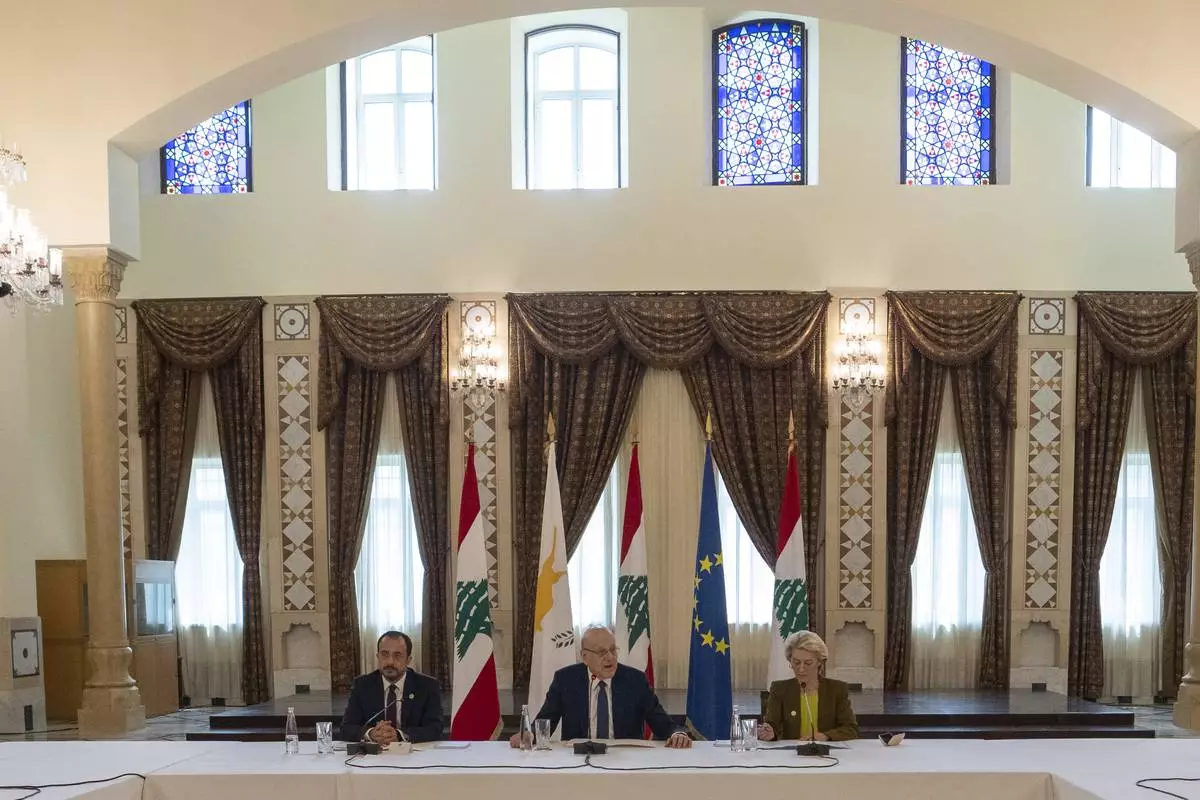
Lebanese caretaker Prime Minister Najib Mikati, center, speaks during his meeting with Cyprus' President Nikos Christodoulides, left, and President of the European Commission Ursula von der Leyen at the government palace in Beirut, Lebanon, Thursday, May 2, 2024. (AP Photo/Hassan Ammar)

Lebanese caretaker Prime Minister Najib Mikati, center, welcomes Cyprus' president Nikos Christodoulides, left, and President of the European Commission Ursula von der Leyen before their meeting at the government palace in Beirut, Lebanon, Thursday, May 2, 2024. (AP Photo/Hassan Ammar)
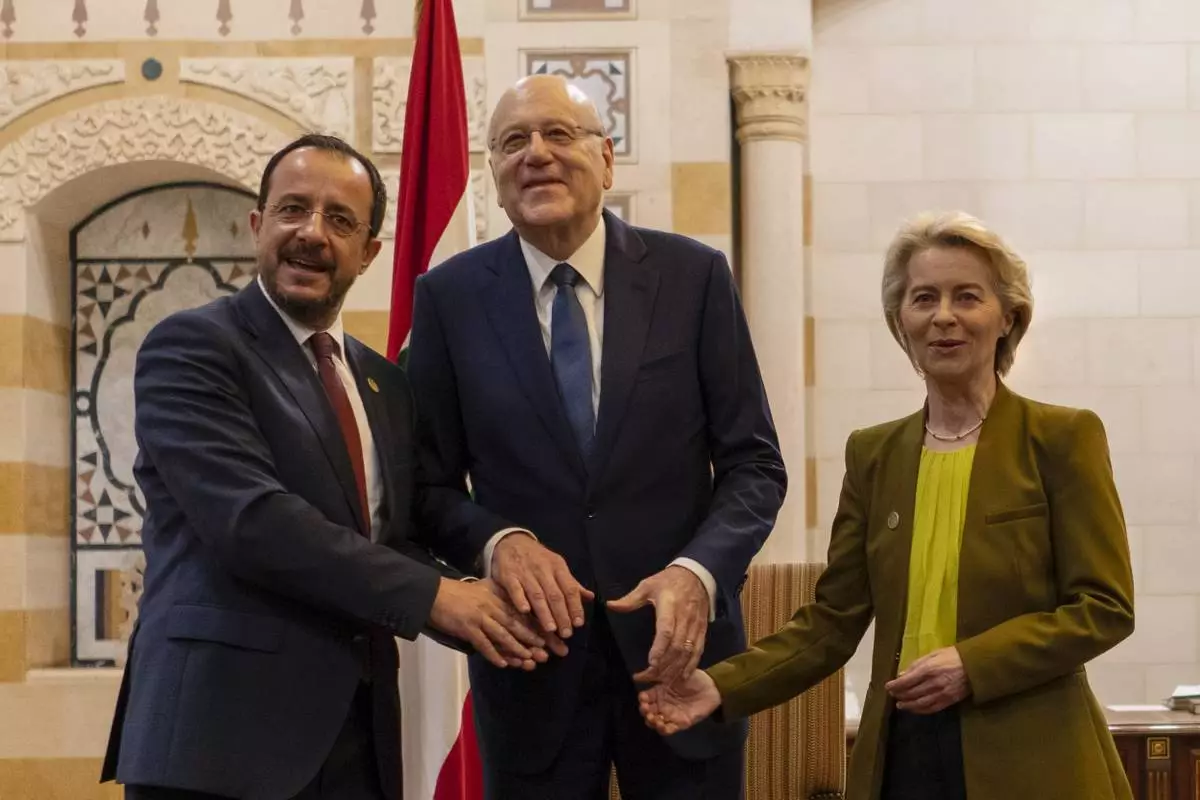
Lebanese caretaker Prime Minister Najib Mikati, center, Cyprus' President Nikos Christodoulides, left, and President of the European Commission Ursula von der Leyen pose for photograph at the government palace in Beirut, Lebanon, Thursday, May 2, 2024. (AP Photo/Hassan Ammar)

Lebanese caretaker Prime Minister Najib Mikati, right, welcomes Cyprus' president Nikos Christodoulides before their meeting at the government palace in Beirut, Lebanon, Thursday, May 2, 2024. (AP Photo/Hassan Ammar)

Cyprus' President Nikos Christodoulides, left, and President of the European Commission Ursula von der Leyen, center, review an honor guard upon their arrival to meet with the Lebanese Speaker Nabih Berri, in Beirut, Thursday, May 2, 2024. (AP Photo/Hussein Malla)

Lebanese caretaker Prime Minister Najib Mikati, center, speaks during his meeting with Cyprus' President Nikos Christodoulides, left, and President of the European Commission Ursula von der Leyen at the government palace in Beirut, Lebanon, Thursday, May 2, 2024. (AP Photo/Hassan Ammar)

Lebanese caretaker Prime Minister Najib Mikati, center, welcomes Cyprus' President Nikos Christodoulides, left, and President of the European Commission Ursula von der Leyen at the government palace in Beirut, Lebanon, Thursday, May 2, 2024. (AP Photo/Hassan Ammar)














